For decades throughout the 20th century, illustrated stories were a male preserve – even in Poland. Despite this, there was no shortage of women creating successful comics. The most popular female author of this period was Szarlota Pawel, author of the extremely popular adventure series – “Jonka, Jonek and Kleks” and the humorous “Winnie the Hell” („Kubuś Piekielny”), ironically depicting everyday Polish life in the 1980s.
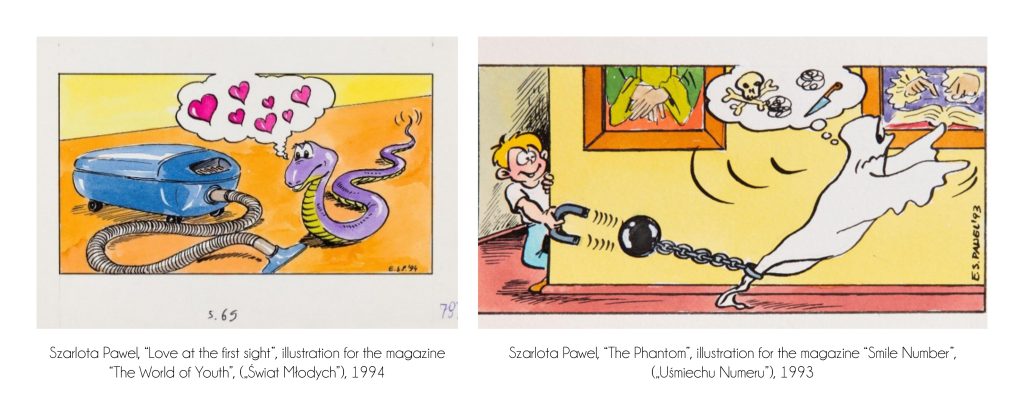
The series of children’s comics “Jonka, Jonek and Kleks” was created in the 70s. The first story was published in the magazine “The World of Youth” („Świat Młodych”). This series is a fantastic adventure, often surreal, full of magic, involving three friends: Jonka and Jonek – two teenagers and Kleks, an imaginary hero: a blue creature made of ink. Jonka and Jonek take part in many incredible adventures outside of reality into which they are “drawn” by Kleks. The adventurers go into a wacky world of fantasy to live unforgettable stories. The three heroes meet many magical and fantastic characters on their way.
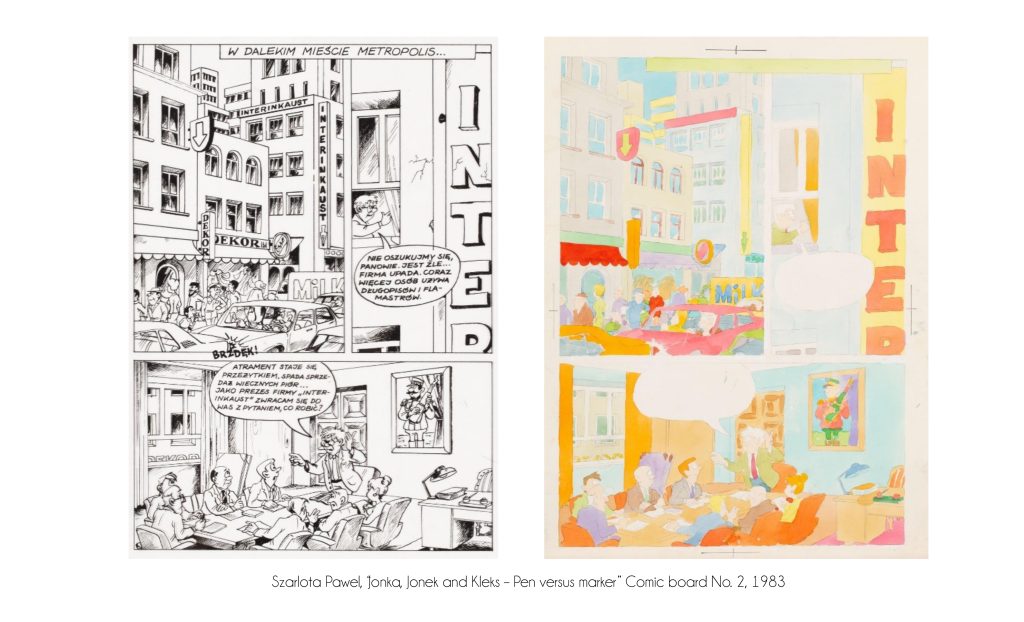
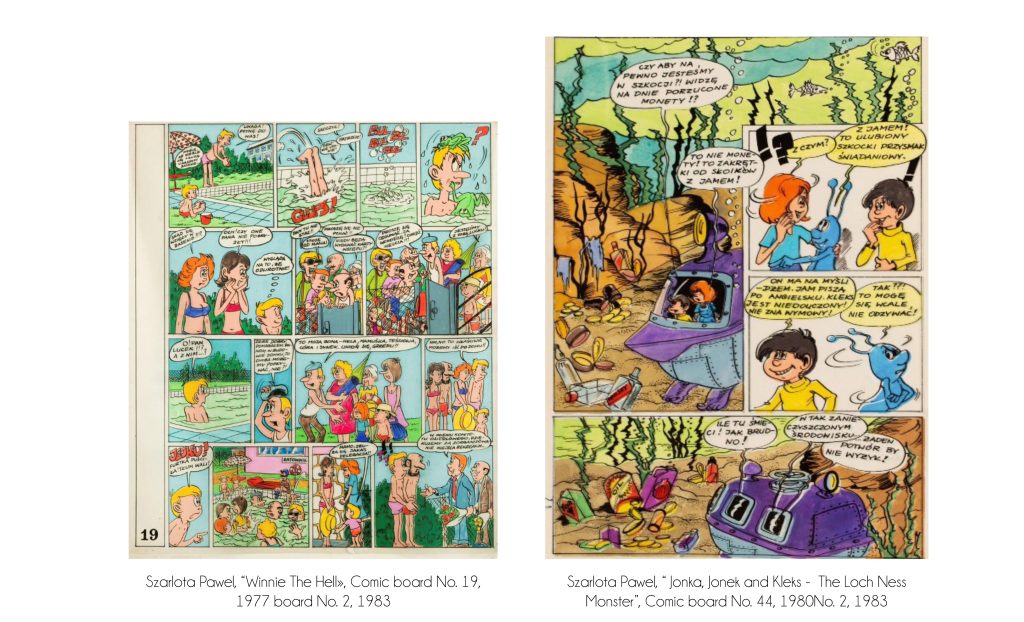
Grażyna Dłużniewska was also very good at frames and phylactery texts featuring, among others, such children’s heroes, such as Bromba, Fikander and Makawity, invented by Maciej Wojtyszko, and so was Krystyna Wójcik, who in the 1970s published comics in the publishing houses of the cities of Wrocław and Łódź. It was not until the 1990s, however, that a new generation of female cartoonists and scriptwriters emerged.
Grażyna Dłużniewska illustrated, among other things, “The Thirteenth Feather of Euphemia” by Maciej Wojtyszko, with whom she also collaborated on the creation of other books. “Euphemia’s Thirteenth Feather” is the story of Apolonia and Eufemia who discover a cosmic hole that turns out to be a tunnel to another universe. This expedition to an unknown dimension is filled with many interesting adventures and dramatic experiences. A simple and enjoyable story set in a fantasy world.
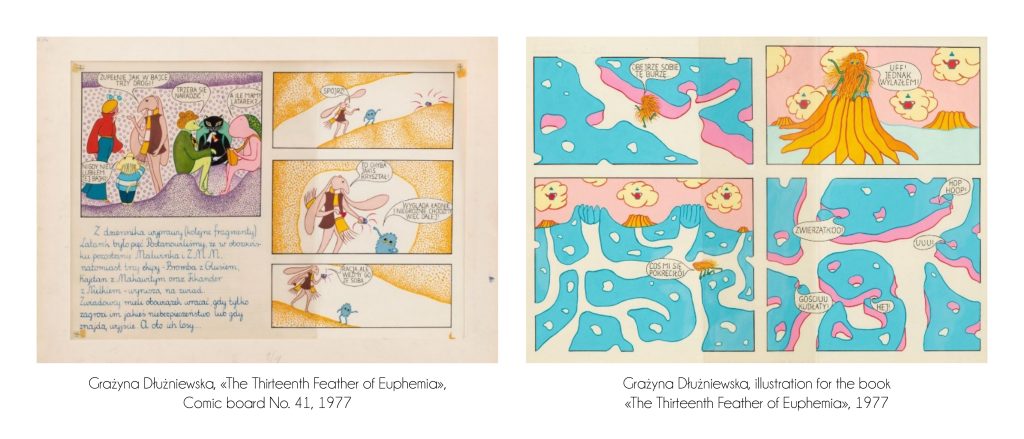
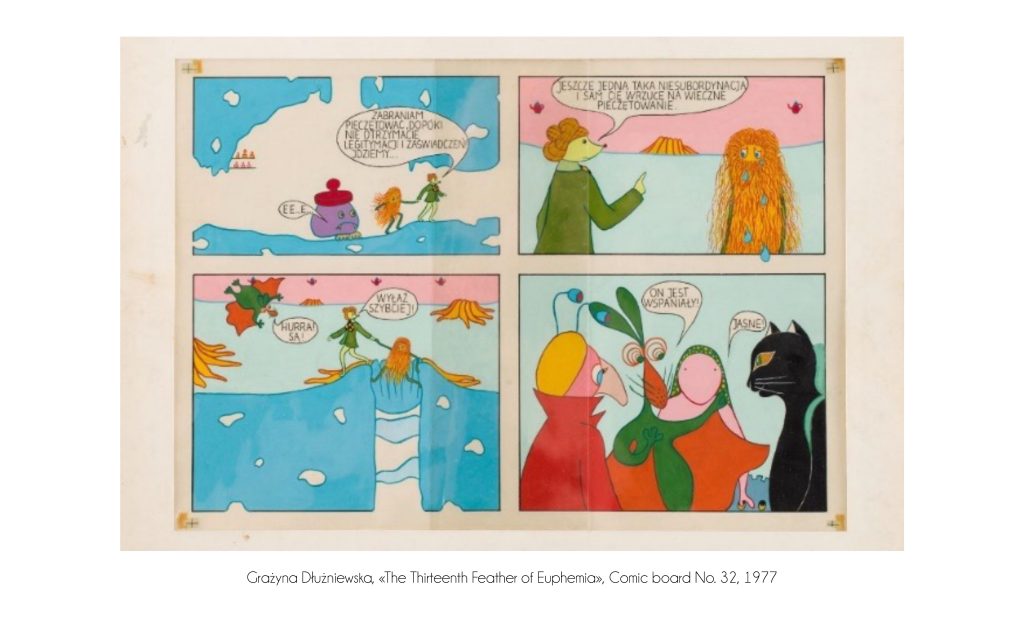
Admittedly, the last decade of the last millennium was a difficult period for Polish comics (collapse of the country’s publishing houses, lack of interest in new, original Polish works, private players entering the market), but this did not prevent great authors such as Aleksandra Spanowicz, Agnieszka Papis, Sylwia Restecka and Joanna Sanecka, from appearing in comics anthologies, magazines and countless albums.
The best years, not only for women’s comics, but for Polish comics, as well, came with the 21st century, and especially with its second decade. The publishing market had been consolidated, with some publishers taking a close interest in Polish authors, and the number of comics events and festivals increased significantly. The media finally began to take a positive view of comic book stories, increasingly shattering the myth that graphic storytelling makes only superficial entertainment suitable for children. Most importantly, the creation of comics in Poland ceased to be the domain of a small, rather hermetic, and mostly male group of artists. Women authors and illustrators have finally been heard – each year, they reaffirm their talents thanks to an increasing number of published comics, and by winning awards and sharing their skills.
At present, Polish women’s comics consist of dozens of creators publishing independent zines, full-length albums, and popular series in official distribution by the largest Polish publishers. Breakthroughs on foreign markets are becoming more and more daring, the most recent example being Maria Rostocka and her sensational album “The End of July” („Koniec lipca”). Published by Kultura Gniewu, this social comic enchanted the public, most of the critics, but also the jurors – who announced “The End of July” as the album of the year at the 31st International Comics and Games Festival in Łódź, and on another occasion awarded it the first place at the Warsaw Comics Festival („Komiksowa Warszawa”). At the end of last year, Maria Rostocka made her debut on the French market and was immediately nominated for the Grand Prix in Angoulême, one of the biggest festivals in Europe.
Maria Rostocka spent part of her childhood in France where she taught herself how to read by reading comics. She continued her studies at the René Goscinny French High School in Warsaw and then studied painting at the Fine Arts Academy. She has, for a long time, made series of paintings, then sequences of images with gouache, before starting to paint short stories in comics, which allowed her to carve a place for herself in the small world of the Polish comic. In 2013, she co-wrote “The bear, the cat and the rabbit” with her husband Michał Rostocki, a book published in Poland and then translated into French by Éditions Michel Lagarde. She then began writing “The end of July”, a book inspired by independent cinema and novels of Jane Austen, which evokes the atmosphere of a village near Warsaw where the author’s grandfather had lived. The book brings together the old and the new, along with nostalgia for the past, optimism for the future and the strange feeling of living in a world where everything combines – vacationing while her grandmother is stuck in front of TV, Alek hangs out with her friend, her friend’s sister, and dogs. There is nothing else to do, it is the end of July. In the official selection for the 2022 Angoulême Festival.
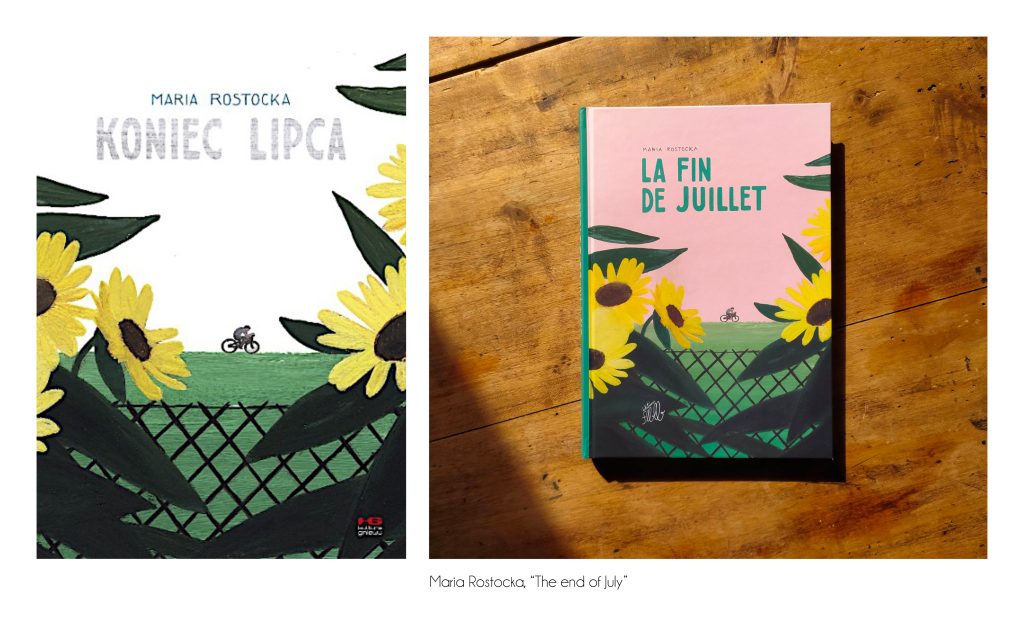
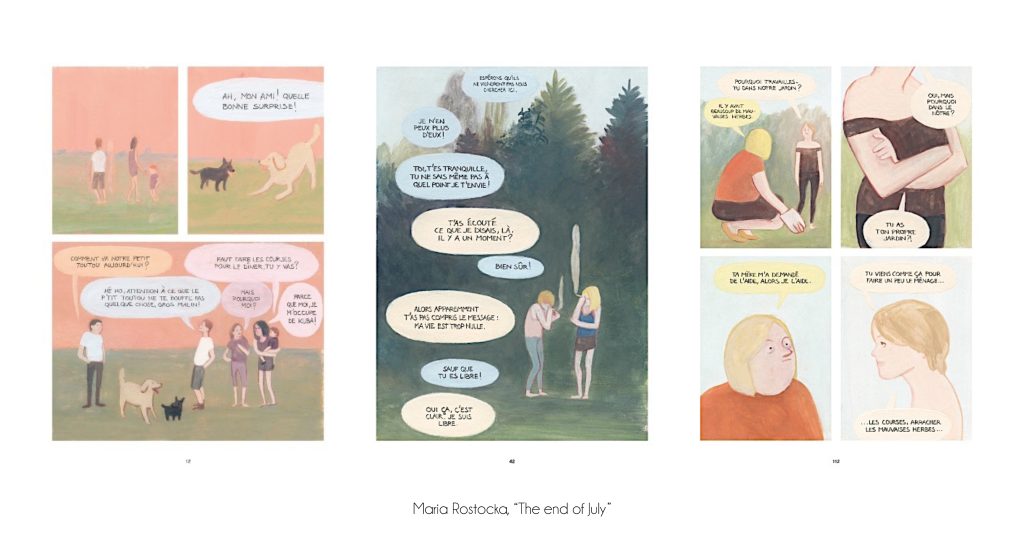
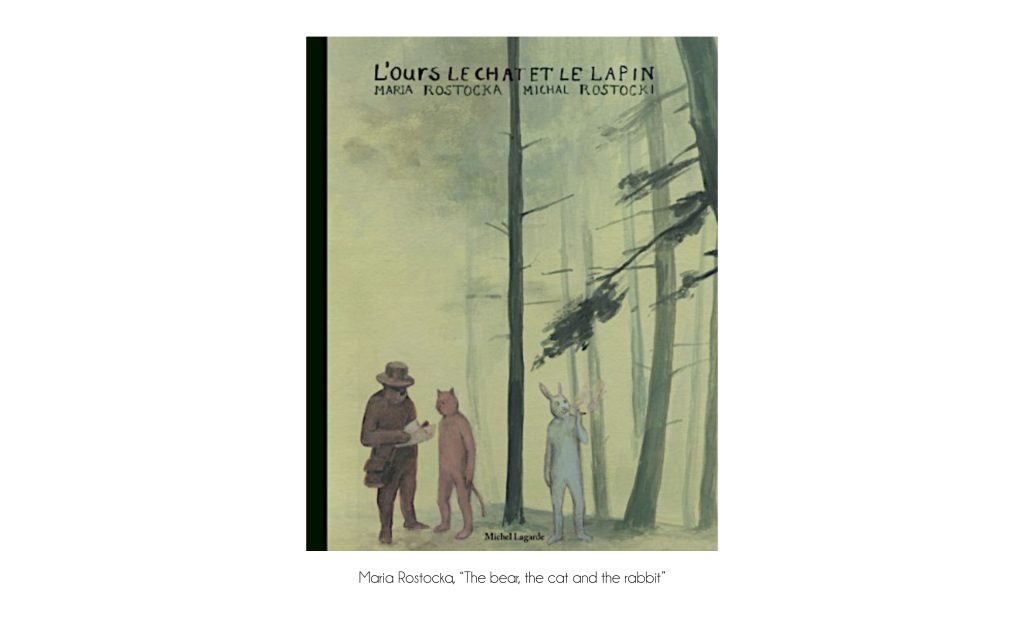
Among the most recognised comic artists in Poland today are Joanna Karpowicz and her albums “Lipstick” („Szminka”) and “Sour Apple” („Kwaśne jabłko”) with scripts by Jerzy Szyłak, two volumes of the story “Anastasia” („Anastazja”) by Magdalena Lankosz and the artbooks of the series “Anubis”.
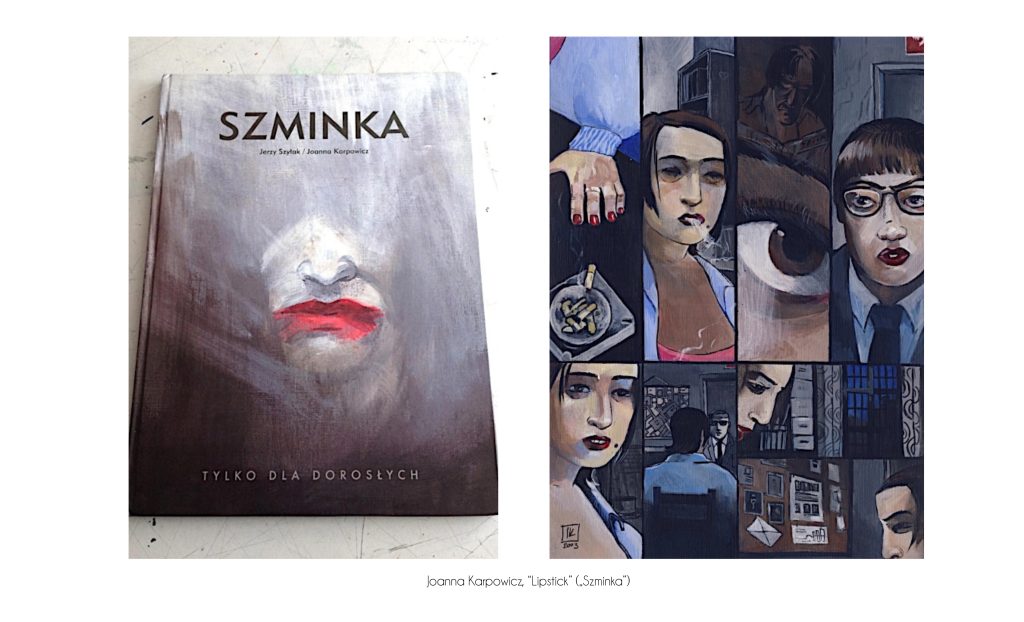
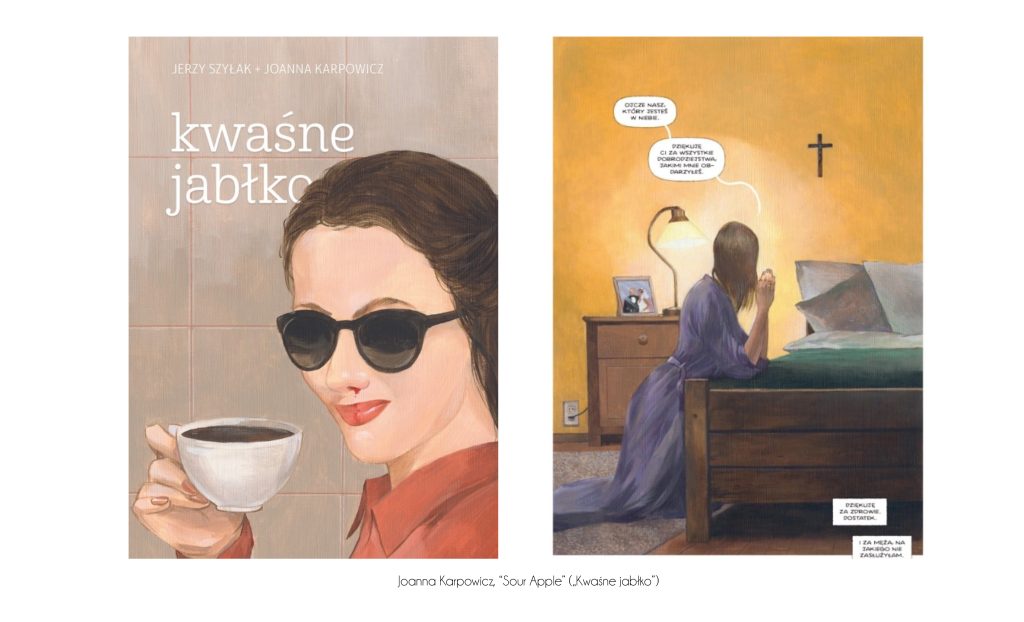
Joanna Karpowicz :
“Lipstick” (Polish title: Szminka) was my first published comic book (Mandragora, 2003). The story was written by Jerzy Szylak, Polish theorist of literature and culture and a scriptwriter, known for his passion for dark, criminal plots. As he describes it: “Lipstick is about crime, the one committed in a dark alley, an offence involving a knife, and the other one – committed with the help of words, accusations, insinuation, and mental abuse of the victim. Lipstick’s main character, Michal Pawluk is a policeman, with an obsession of capturing and punishing a dangerous psycho killer – he is decided to do it at any cost. Situation seems to be simple: crime and punishment. Motivations of the characters, though, are far away from being simple. This comic story contains drastic scenes, shows horrible crimes. But the worst of them is the one you can’t see”. The action takes place in Cracow, so those who know the city can see a bit of familiar places.
Other noteworthy authors are: Agnieszka Świętek, the author of “Rufus” with a screenplay by Bartosz Sztybor and “The Little Promise” („Obiecanek”), which was recognised as the best Polish album at the 29th MKFiG in Łódź; Unka Odya, author of the series “Brom” – a fantasy adventure for young people, the first volume of which won the competition for the best Polish album at the 30th IFCG; Anna Krztoń, the author of the album “Get hold of yourself” („Weź się w garść”) and numerous autobiographical fanzines; and Katarzyna Witerscheim, the creator of the historical series “Helena Wiktoria”.
Rufus is a wolf, but he doesn’t quite understand what that means. He only knows that other animals are afraid of him and try to avoid him. Therefore, Rufus is reconciled with the fact that no one wants to adopt him for a long time. However, his life makes a U-turn when a family of sheep decides to take care of him. Rufus finds himself in a world where he begins to discover who he really is. Winner of an award during the third edition of the Janusz Christa Children’s Comic Contest.
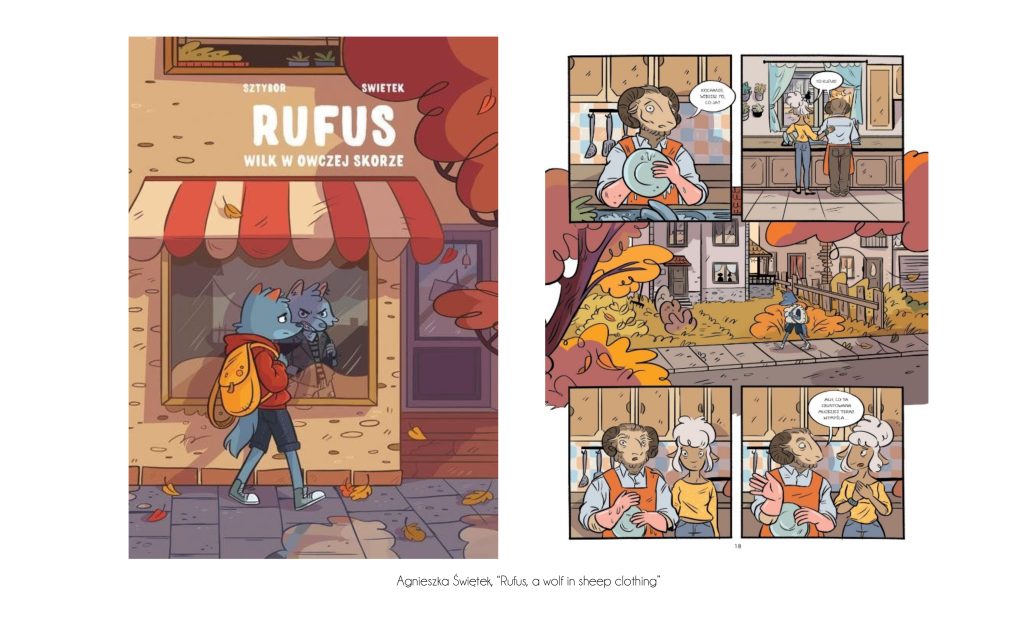
But let’s not forget to mention Agata Wawryniuk, who received the 24th MFKiG Award for Album of the Year for “Polish-English conversations” („Rozmówki polsko-angielskie”); Marta Falkowska, the author of the children’s series “This is Tosia” („Oto Tosia”), but also of comics for an adult audience; Edyta Bystroń, who publishes in fanzines, but also full-length albums, among others “Obligatory meeting” („Zebranie obowiązkowe”) and “Everything will burn in the end” („Na koniec wszystko spłonie”); Agnieszka Surma with the children’s series “Pikapidula” and Barbara Okrasa, Monika Laprus-Wierzejska, Anna Helena Szymborska, Beata Sosnowska and many other artists…
“Polish-English Conversations” is a story, written and illustrated by Agata Wawryniuk, about a disillusioning stay in London. Leaving Poland to exercise the freedom of an EU citizen who can take up employment in the UK, Wawryniuk experiences disappointment, dismay, and regret. Her story mirrors that of many other Poles and Eastern Europeans who leave their countries in search of a “better life”. Wawryniuk, through words and black and white images, defines emigration by showing both its sunny and shady sides. This graphic novel was named The Best Comic Book of 2012 and won the Hiro magazine award, a scholarship for the best debut and reached the finals of the Polish Radio 3 talent competition.
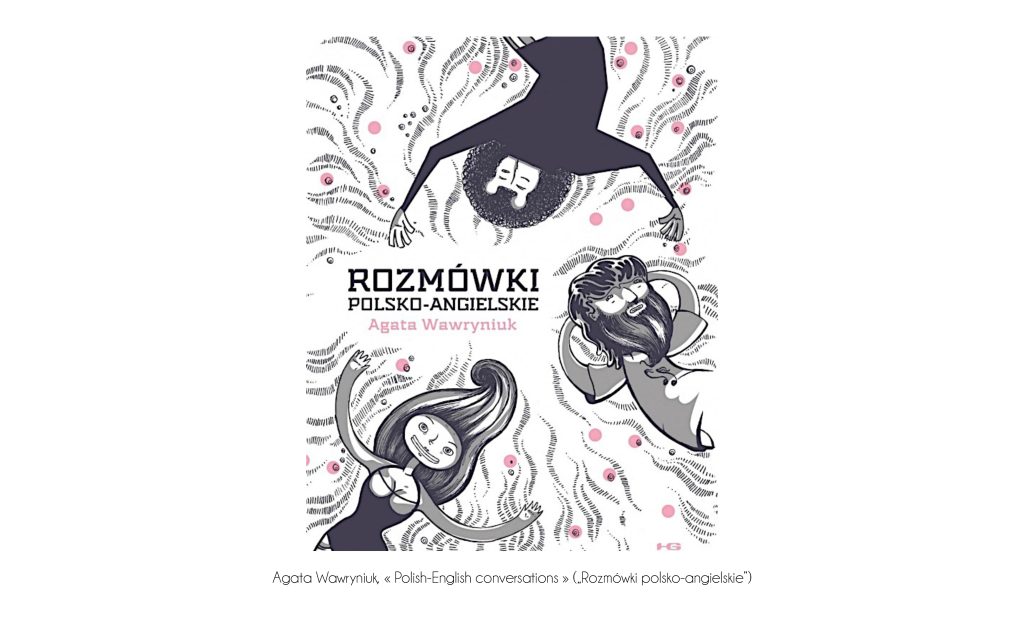
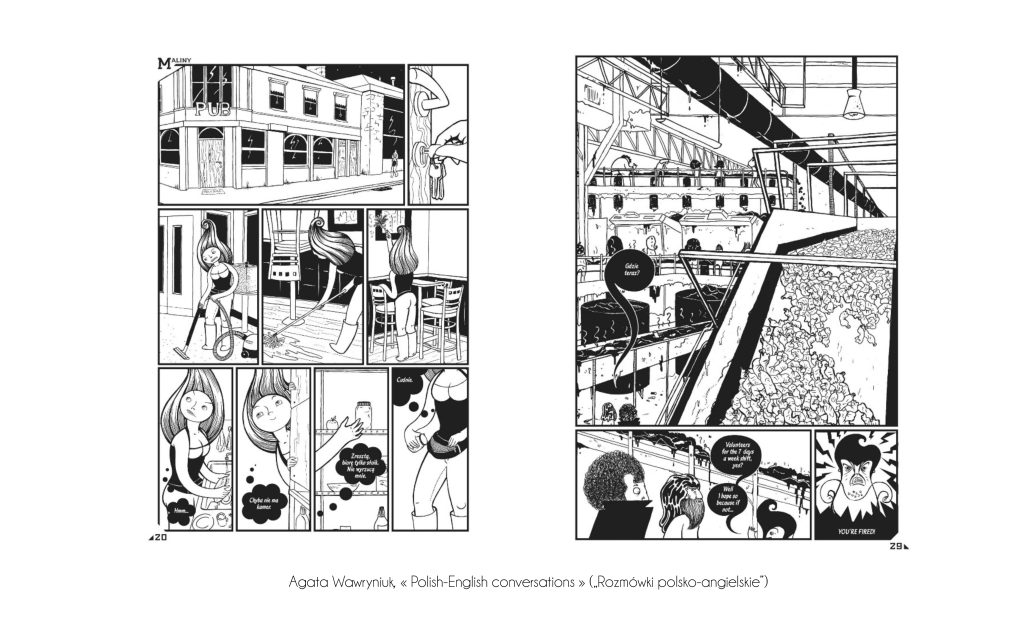
All the above-mentioned artists have their own recognisable style and use a wide variety of techniques – from simple black and white line drawings, through all kinds of digital techniques, to classic oil painting. The subjects are also varied. Fictional stories, different points of view on human relationships, feelings and emotions dominate – also in stories for younger readers. But there is also humour, fantasy, adventure, and excitement in women’s comics.
(…) It is gratifying to see that more and more Polish authors’ names are appearing on the covers of comics published abroad. The most recognisable author on the French-speaking market is Marzena Sowa – the scriptwriter of the “Marzi” series, a popular series about the childhood of a protagonist during communism in Poland, but also the author of numerous other comics published in Poland and abroad. One such album is “Wild Fern Tonight” („Tej nocy dzika paprotka”), drawn by Berenika Kołomycka – an excellent illustrator and author of the award-winning children’s series “The Little Fox and the Big Boar” („Malutki Lisek i Wielki Dzik”), which has also been published abroad.
“Marzi” series was born from the meeting of a Polish woman who had come to study in France and a cartoonist. He listens to her childhood memories, and finds her stories delicious, spicy, extremely refreshing, and full of emotions. “Marzi” are short stories that speak of a country still little known, Poland, both before and after the fall of the Wall, seen through the eyes, first, of a child, then, a teenager, and, finally, a student.
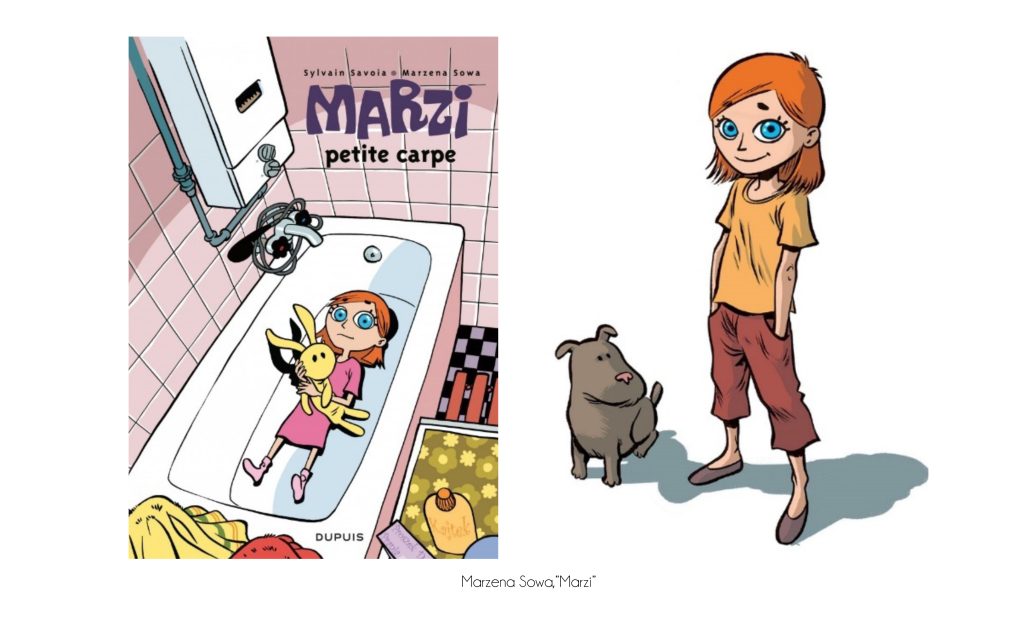
Illustrator Zosia Dzierżawska, in collaboration with scriptwriter Charlotte Malterre-Barthes, created the album “Eileen Gray” about the life and work of the famous architect, which was published in Great Britain, Canada and the USA. The US publications include Katarzyna Niemczyk with the series “Mockingbird” and Marianna Strychowska, who drew a volume of the famous series “The Witcher” („Wiedźmin”) to Aleksandra Motyka‘s script. Last year, cartoonist Magdalena Kania made her debut on the American continent, collaborating with scriptwriter Maciej Kur. Their joint work “Delisie” was published in English in the United States and translated into French in Canada. The duo also created an intriguing comedy for young readers, “Emilka Sza”.
Although this is only the beginning, we hope that the number of Polish women authors publishing abroad will continue to grow over time (…).



